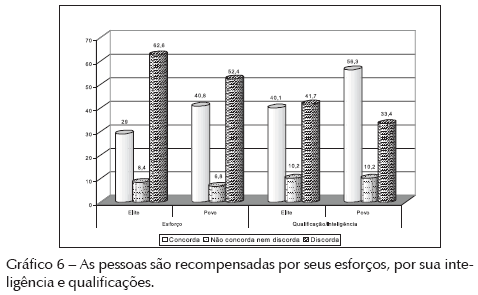Studies about social inequality in Brazil usually focus on its objective dimensions, such as sex, colour, income, occupation, and schooling. The size of the gap between rich and poor is reasonably well known thanks to studies already carried out, but little is known about how the disparity is seen by Brazilians. In 2000, as part of the International Social Survey Programme, an attempt was made to fill this gap through a survey of members of the national elites - here understood as individuals in the richest 10% of the population. The nationwide study - 2,000 interviews in 195 towns and cities - sought to reveal different perceptions of inequality by the "elite" and the "people". The survey raised issues related to the images both groups have of Brazilian society and how it is structured; the appropriate wages for differently qualified workers; the values that should govern distribution of the country's wealth; Brazil's major problems; and the strategies favoured by each group to reduce poverty, with an emphasis on the role of the State. The answers showed surprising agreements and disagreements between the people and the elite. Both groups recognise the scale of social inequality in the country, but they tend to advocate different strategies to reduce them, transferring solutions to inequality to the State. These similarities and differences in points of view may provide important elements for understanding the mechanisms that legitimise inequality.
inequality; justice; equality; social perceptions; elites








